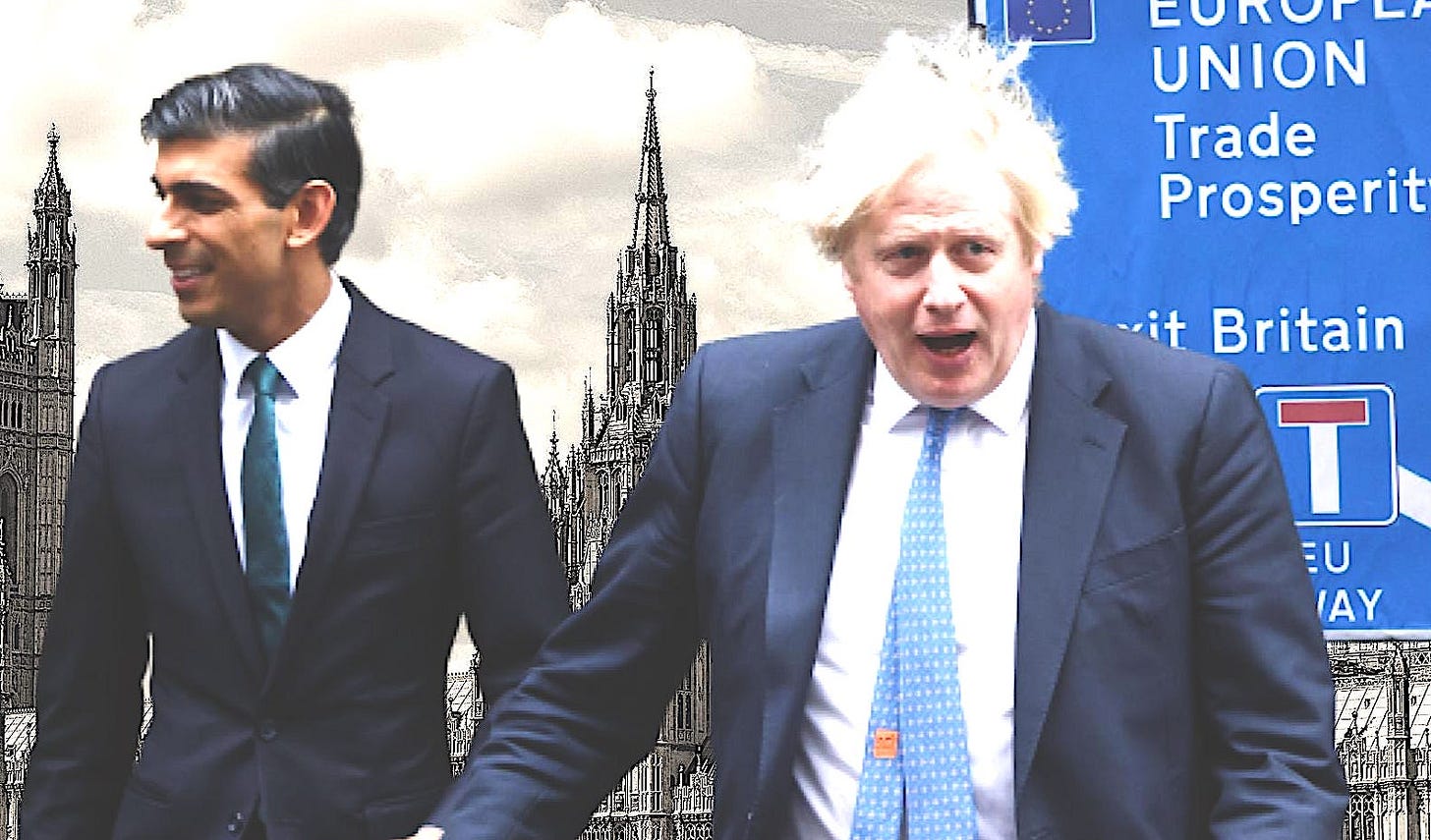Feudal Britain: How Brexit Robbed Us of Our Democratic Rights
Plans to scrap thousands of EU-derived laws is part of a project designed to take away our power as citizens, argue Hadley Coull and Dr Chris Ogden
The erosion of democratic freedoms in Britain in recent years is startling.
The Police, Sentencing and Courts Act 2022 has severely restricted out right to protest, while the Elections Bill will make it mandatory for voters to show a form of photo ID, disenfranchising around two million (disproportionately poor and non-white) people who do not have authorised forms of ID.
Meanwhile the Nationality and Borders Bill allows the Home Secretary to remove the citizenship rights of dual nationals and naturalised British citizen and the Judicial Review and Courts Bill prevents citizens from being able to challenge how the Government implements and interprets the law. At the same time, the proposed Interpretation Bill will permit the Government to reject any judicial review findings, thus politicising the courts, as well as undermining their fundamental purpose.
Meanwhile the proposed Strikes (Minimum Service Levels) Bill will effectively preclude intended strike action by unions, forcing their members to either work or be fired. Turbocharging this process has been the principle behind the Coronavirus Act, which allowed the Government to introduce laws without parliamentary scrutiny – as has the widespread use of so-called Henry VIII powers.
This democratic recession has resulted in a Britain that, rather than consenting to rule of law, is increasingly subjected to rule by law, with a government that sees itself as above the law, creating legislation for its own convenience, and a weakened civil society with universal suffrage threatened to the point of voter suppression. Alongside the state’s pervasive surveillance capabilities, these reductions signal Britain’s new authoritarianism and severely diminished political freedoms.
Into this repressive environment comes the proposed axing of at least 3,745 pieces of European Union legislation by the beginning of 2024 under the Retained EU Law (Revocation and Reform) Bill.
This law will give the Government what The Guardian called ‘powers to expunge laws ranging from workers’ rights to regulatory protection for the environment without even a debate in parliament’, unless successful arguments are made in their favour.
According to the Government’s own Retained EU Law Dashboard, at least 570 of these laws relate to food, agriculture, farming and the environment, 424 to transport, 374 to banking and financial services, 228 to revenue and customs, and 212 to work and pensions. Many of the laws also concern minimum safety standards for goods and travel.
The scope, scale and importance of these laws is noted by a committee of peers: “we are not talking about antiquated or redundant law but functioning law that is central to our everyday life. This includes laws concerning employment, health and safety, food safety, food labelling, animal welfare, consumer protection, habitats, environmental regulation, water and air pollution, tobacco, working time, competition, and many others”.
Offshored
Given the explosion of bureaucracy that accompanied Britain’s withdrawal from the European free market, the mass removal of such vital regulations and laws will invoke further uncertainty, chaos and decline in the UK’s economic and social fabric. This will be to the significant detriment to small and medium-sized businesses, but most importantly, it will cause harm to workers who will find themselves with little to no say over their working conditions.
Those who will benefit from the removal of the regulations are the multinational entities based outside Britain, whose owners seek to maximise profit at any economic or social cost. A deregulated Britain that is actively constraining and curtailing rights, optimises these aims, and thus serves to fulfil Brexit’s promise as a ‘magic door to the sunlit uplands’ –but only for the very rich.
Reducing democratic rights directly reduces the possibility for dissent and for difference. Widespread and increasing precarity through declining living standards, stagnant wages and crumbling social and health services, mean that the focus for many is day-to-day survival. In this environment, wider social opposition is dramatically weakened.
The siphoning of wealth from countries into the offshore space is becoming ever more evident.
It is occurring not only in the form of the misallocation of resources, as shown throughout the Covid-19 pandemic by the non-competitive granting of at least £3 billion in contracts.
It is also illustrated by the Bank of England’s £875 billion in quantitative easing from November 2009 to November 2020, money which predominantly went to the financial, construction, transport, real estate and manufacturing sectors. This figure was equivalent to 3.9% of Britain’s total GDP from the period spanning 2010 to 2020.
While keeping interest rates low in this period, quantitative easing also significantly drove up asset prices, thus further enriching the wealthiest corporations and households, rather than being injected into the economy and creating jobs and investment, as had been ostensibly intended.
In turn, Britain’s natural resources and infrastructure have also been successively sold off, often at below market prices. In 2018, 70% of England’s water industry was owned by foreign corporations. In 2017, around 77% of the UK’s gas distribution network and over 88% of its electricity distribution network was foreign-owned mainly via entities incorporated in the United States, China and the Abu Dhabi, among many others.
To these can be added the privatisation from the late 1970s onwards of British Aerospace, Cable & Wireless, Jaguar, British Telecom, Britoil, British Steel, British Petroleum, Rolls Royce, British Airways, British Coal, British Rail and Royal Mail. These privatisations have ultimately only benefited shareholders and financiers, who overwhelmingly reside outside of Britain.
This is known as neoliberalism, a process of wealth redistribution and extraction that is weighted in favour of the rich and powerful. Inequality is hardcoded into the economic model that governs our society, which siphons money from the people and the natural resources of the nation.
In early February this year, the FTSE 100 stock exchange reached 8,000 points for the first time. This is seemingly paradoxical given that Britain’s economy will shrink in 2023 according to the IMF. Yet such a phenomenon is possible because most of companies listed on the exchange are multi-national in nature, so their success is independent of Britain’s fortunes.
The Post-Brexit Wild West
For its architects, the manufactured crisis of Brexit was not just simply about a return to the supposedly glorious past of Empire, with Britain as an all-crusading global power. It also has a domestic side, typified by subjugation, hierarchy, and rule by the very wealthy: the absolute opposite of the promise of a return to autonomy and self-determination for the people of Britain, as made during the 2016 EU referendum.
Aided by chaos and uncertainty in the aftermath of Brexit, itself heightened by a decade of austerity that has weakened the country’s social fabric, and with our democratic rights being successively eroded and removed, a new Britain is emerging.
In this world, only money talks. Your agency and life possibilities are based upon your financial position. Your access to core rights – education, health, protection, and justice – are similarly stratified: gained only via payment, property, and position. Those without such advantages will be left to survive on their own in this new Wild West.
Welcome to Feudal Britain. Leave your rights at the door. Think yourself lucky to have a job. Celebrate when you can eat and heat yourself and your family. Say goodbye to your dreams and embrace a future where you no longer question your station in life.
Dr Chris Ogden is a senior lecturer in International Relations, at the University of St Andrews.
Hadley Coull is an independent writer and researcher, who runs insight collective, Headz




